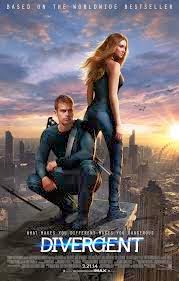
Divergent
4 out of 5 stars
Rated PG-13
Mild language
Moderate amount of violence including a person's hand getting stabbed
Very little blood as a result of cuts
Some sexual content including the implication that a rape will happen, but nothing is shown.
While "Divergent" has its share of clichés, the world it introduces is fascinating to watch.
It is set in a post-apocalyptic future. Rather than a huge nation under control of a central government like "The Hunger Games," it is set in a single city, which is run as a utopian society.
Almost everyone there belongs to one of five groups — known as factions — each with its own roles. The dauntless are physically fit police officers sworn to protect. Abnegation is a group of service oriented people who help others and serve as the government heads. Erudites are knowledge seekers who advance in science. People in Amity do farm work, and Candors are brutally honest individuals. The people who do not belong to any of these groups are known as "factionless" and are comparable to the homeless.
Members of this utopia choose which faction they want to be in when they are sixteen years old. They have a good idea of which one they should go to by taking a test. The main character, Tris (Shailene Woodley), goes through this test, and her results are inconclusive, which is known as "divergent." She is told to not to disclose this to anyone because divergents are hunted down. They are individualists, which is a threat to those in power.
Tris tells everyone that her results were abnegation, but when the time comes for her to choose which faction to be in, she goes to dauntless. Most of the plot is centered around her experiences as a new recruit to that faction.
The concept of the society itself is very interesting. When Tris actually gets into dauntless, it is intriguing to see the sub-culture of the faction unfold. A lot is new to the main character as well, so much of the film is the audience discovering various things with her.
There is a lot of story the movie has to go over. Because of this, it feels like certain things that should have been more emotional are not. It never gives the audience time to get to know characters that should be more important.
One such character is Jeanine (Kate Winslet), a Erudite in a position of power. She becomes the antagonist of the story, but her whole plan is developed very poorly. It is only known because people talk about it a few times. This movie could have benefitted by straying from the book a little bit and showing the antagonists' perspective.
"The Hunger Games" movies did this. They are both based on books written in first-person, which only include main character's point-of-view. The movies take an extra step and show what is going on from the perspective of the villain. This gives the films a depth that is not present in the novels. It would have been great to see "Divergent" do the same thing.
The film is based on a young adult novel, so it definitely has cliché moments. Tris is a bland girl who is somehow different from everyone else. This ends up being of upmost importance in the end. She also gets involved in a romance with a strong, good-looking man named Four (Theo James).
I will admit to not being a big fan of the romance. It seems a little forced especially in the scene in which they have their first kiss. It is made extra cheesy because of a pop song that accompanies it. However, the love story does not bother me that much. There is a surprising amount of relevance to it that drives the story along.
While Shailene Woodley does not deliver an outstanding performance, it is appropriate casting. There is a sense of innocence about her that is interesting to see in contrast to the rough world of the dauntless. It is supposed to change her, but Woodley's limitations in acting prevent this from being believable.
My rating for this film is a little higher than what most critics would give it. While there is not a lot of depth to the characters, I found it very entertaining to see the world it portrays. It is worth seeing in theatres.








